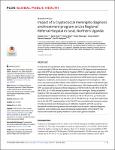Impact of a Cryptococcal meningitis diagnosis and treatment program at Lira Regional Referral Hospital in rural, Northern Uganda
Date
2022Author
Link, Abigail
Okwir, Mark
Meya, David
Nabongo, Betty
Okello, James
Kasprzyk, Danuta
Bohjanen, Paul R.
Metadata
Show full item recordAbstract
Abstract
In rural areas of sub-Saharan Africa, infrastructure and resources for treatment of crypto coccal meningitis (CM) are often lacking. We introduced a CM diagnosis and treatment pro gram (CM-DTP) at Lira Regional Referral Hospital (LRRH) in rural Uganda to determine if
implementing high-quality standard of care protocols would improve outcomes. Information
extracted from hospital charts and clinical record forms at LRRH were used to compare
diagnoses, treatments, and outcomes for all patients diagnosed with meningitis (n = 281)
over a two-year period after initiation of the CM-DTP in February of 2017 to all patients diag nosed with meningitis (n = 215) in the two preceding years. After implementation of the CM DTP, we observed increased confirmed diagnoses of CM from 22.2% (48 of 215) to 35.2%
(99 of 281), (p = 0.002) among all patients diagnosed with meningitis. Among all patients
treated for CM, the proportion who received standard of care treatment with amphotericin B
plus fluconazole increased from 63 of 127 (49.6%) to 109 of 146 (74.7%), (p <0.001) and
mortality improved from 66 of 127 (52.0%) to 57 of 146 (39.0%), (p = 0.04) after implementa tion of the CM-DTP. Implementation of the CM-DTP was associated with increased number
of lumbar punctures and decreased use of antibiotics in patients with CM, as well as
decreased mortality among patients with meningitis from all causes. Improved diagnosis,
treatment, and mortality were observed following implementation of the CM-DTP. Our
results demonstrate that quality treatment of CM in rural Uganda is feasible
Collections
- Research Articles [17]

